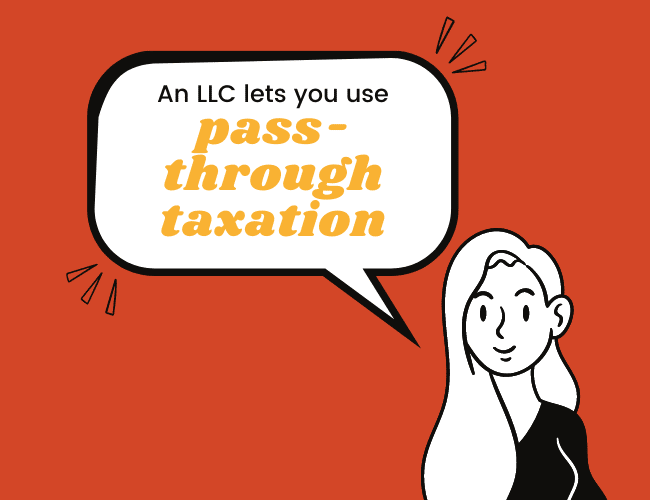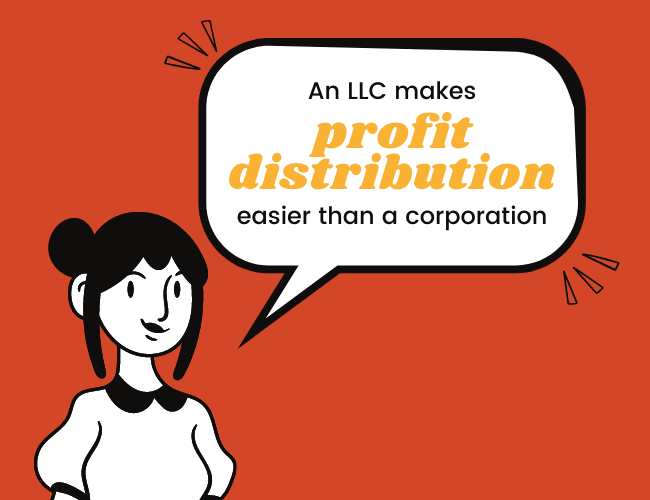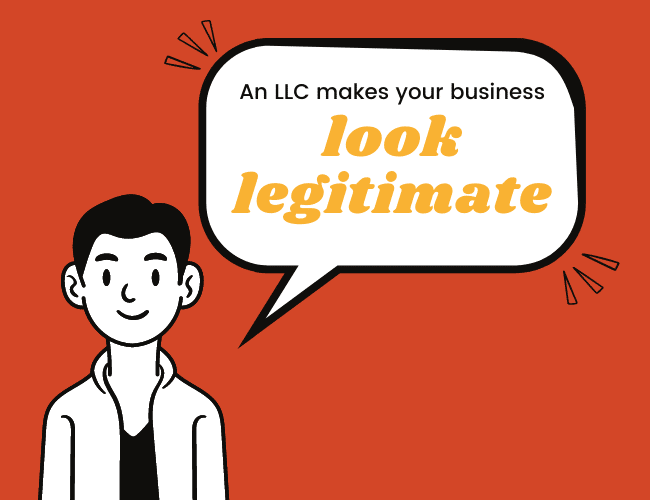You’ve probably heard about Limited Liability Companies (LLCs), but you might not know the outstanding LLC advantages that they provide. You should consider forming an LLC if you’re worried about business activity affecting your personal assets and want to save on business taxes.
Let’s walk through the benefits of having an LLC structure, plus some disadvantages that may point you toward another type of business formation.
Why should you form an LLC?
Limited Liability Company, or LLC, is a business structure that provides some benefits of a corporation and some benefits of a sole proprietorship or partnership.
An LLC helps separate your personal liability from the company’s, the same way a corporation does. But LLCs also allow business owners to count the company’s profits as personal income and avoid corporate double taxation, similar to a simple sole proprietorship or partnership.
Forming your business as an LLC is essentially the best of both worlds: you’ll be personally protected from lawsuits or debts against your company, and you won’t have to pay taxes twice.
Top 5 LLC Advantages
There are several benefits of registering your business as an LLC. The two most important advantages are the protection of personal assets and the ability to enjoy pass-through taxation.
1. Top LLC Benefit: Personal Asset Protection
The first and most important advantage of an LLC is the personal asset protection it provides you as the owner. The name says it all: limited liability companies limit your personal liability if things go awry.
Picture this: Your small business gets sued by a client for failing to fulfill a contract. (We know, you would never do that, but roll with us here!)
If your business is a sole proprietorship or a partnership—the default classifications for unregistered businesses—the lawsuit will not only threaten your business but also your personal assets! You could lose your personal home, car, savings, and more. Sounds scary, right?
One of the top LLC advantages is that it protects you from this scenario. Registering your business as an LLC prevents any creditor or plaintiff from going after your personal assets.

2. Tax Benefits of LLC: Pass-Through Taxation
Don’t forget the tax benefits of LLCs! A major advantage of registering your business as an LLC is that you can use pass-through taxation.
This means the business’s income passes through to your (and other business owners’) personal tax returns instead of being taxed as corporate income.
Pass-through taxation is one of the tax benefits of LLCs, partnerships, sole proprietorships, and S-corps, and is a popular choice for small business owners.
If you register your company as a corporation, on the other hand, you will have to pay corporate income tax on your business’s net revenue, plus taxes on your own dividends—essentially getting taxed twice. Nobody likes taxes the first time around, and registering your business as an LLC will prevent Uncle Sam from double-dipping into your pocketbook.
Even if you are in the early phases of creating a business, it’s never too early to consider your tax obligations.

Will an LLC provide the best tax structure for your company? Speak to our skilled tax attorneys at Gordon Law Group to discuss all your options. We’ve helped countless clients form businesses with the lowest possible tax obligations.
3. LLC vs. Corporation Advantages: Easy Profit Distribution
If you’re converting an unregistered business into an LLC, you’ll still have the ability to call the shots and run the business entirely on your own terms while enjoying all the other advantages of a more formal business structure.
An LLC also makes it much easier to set up a flexible profit-sharing plan between business owners.
Other business models require complex rules for splitting up the managerial duties and profits. LLCs allow the owners to easily control who gets the profits and when.

4. Benefits of LLC: Minimal Red Tape
Although LLCs require some annual paperwork, the amount of added work is nominal compared to the benefits. In many cases, LLCs don’t have to adhere to special regulations besides properly paying taxes and ensuring the business is in compliance with state law.
Corporations, on the other hand, have a long list of guidelines and restrictions limiting the types of transactions they can make and business they can conduct.

5. Why Form an LLC? Heightened Credibility
One of the most important benefits of an LLC is that it’s recognized as a more formal business structure than a sole proprietorship or partnership. Including “LLC” in your business name lets customers and other professionals know your business is credible.
Another advantage of forming an LLC is the fact that you must register your name with the Secretary of State, so no other business can register the same name as you! No need to worry about your hardworking business being confused with the scammer across town.
With an LLC, the name and image of the company is your own, providing a heightened level of credibility when trying to attract new customers.

Is an LLC structure right for you?
Before you run off and start filing your LLC paperwork, let’s cover some of the reasons you may not want to run your business as an LLC.
Although LLCs offer many business advantages, there are some cases where a different business structure may be a better fit for your needs.
Our experienced tax and business lawyers at Gordon Law Group can examine your current situation, as well as your future goals, to help you determine which business structure would be most beneficial for you.
LLC Disadvantages for Smaller Businesses
If you haven’t formally registered your business, then you automatically fall into the category of a sole proprietorship or general partnership. In this case, forming an LLC will create the additional expense of an initial registration fee and annual filing fees.
The amount varies state to state, but in Illinois, the registration fee is $150 and the annual filing fee is $75.
This is just a drop in the bucket compared to what you could potentially be saving in personal assets by registering your business as an LLC. (Plus, these fees can be written off as a necessary business expense.)
Another potential disadvantage of forming an LLC is the fact that checks and payments made out to your business must go into a dedicated bank account—no more depositing business checks into your personal account.
Even though this may seem like a hassle, our experience representing countless businesses suggests that separating personal and company finances is a good practice regardless of your business structure.
LLC Disadvantages for Larger Businesses
While an LLC can protect you from the double taxation of corporate business structures, owners of an LLC are typically required to pay self-employment taxes. If your business is running at full steam and you find yourself taking in a large chunk of change, this self-employment tax could become burdensome.
Some business owners find that an S-Corporation, where owners can be considered employees and avoid self-employed taxation, is a more beneficial business structure when the owners are taking in a greater profit.

If your LLC business becomes so successful that an investor or buyer makes an offer you can’t refuse, LLCs are typically harder to transfer than corporations. There are many complex tax requirements that must be met in the transference of assets and liabilities.
Make sure to get the advice of one of our legal tax advisors if your end goal is to eventually sell your business.

Now You Know the LLC Advantages and Disadvantages; The Choice is Yours!
Registering your business as an LLC is not the best choice for everyone, but it is a great way to ensure that your personal assets are protected from potential liability. LLCs are one of the fastest growing business entities for a reason: they protect the business’s owners while often providing the lowest tax obligations.
Call the experienced business attorneys at Gordon Law Group to discuss your options and choose the right path for your business formation!
Ready to make the leap? Learn how to create an LLC in Illinois.
